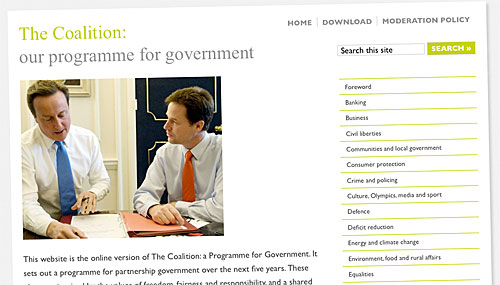
Out of the blue last week, I got a call from COI: was I available for an immediate, rapid turnaround WordPress job? I was a bit startled, and detail was lacking; but since this was precisely the kind of rapid-response thinking I’ve been trying to foster around WordPress for a couple of years, I couldn’t really say no.
As it turned out, the project in question was the Coalition Programme for Government: and the mission was to build a commentable version of it, by the next morning. COI’s initial proposal was to use Steph’s Commentariat as a base; but given the document’s structure, it didn’t feel like a good fit. Plus to be honest, I knew I’d be more comfortable working with my own code, as opposed to unpicking Steph’s – and time was too tight.
The theme came together fairly quickly, helped in no small part by the source document’s fairly plain design – which I basically mimicked, with a couple of tweaks for better web usability. Extracting the text from the supplied PDF was excruciating, as you’d expect. But by the time I got to bed at about 2.30am, having barely left the keyboard since lunchtime, the site was ready, and my part of the work was basically done. It went live at 9:30 the next – well, technically the same – morning.
Now… I’m going to skip over the next bit, because I’m not the right person to tell the story. Suffice to say, people came in their many tens of thousands. And although measures had been taken to handle the expected load, the platform wasn’t ready for quite that volume of interest.
But now, a couple of days older and wiser, the site has been re-enabled: and the comments are starting to come in. This in itself presents some interesting challenges: the document is, by its very nature, more party-political than most, and the comments will be too. The civil service’s usual get-out clause – about the government being democratically elected, on the basis of its manifesto (singular) – doesn’t really work this time. Thankfully, applying the moderation policy is someone else’s problem.
Of course it’d be nicer if things had gone perfectly smoothly on launch day. To some extent, we’ve missed the boat in terms of the immediate wave of interest; but arguably, the comments might be more considered, with the benefit of a weekend to reflect and cool off. (Well, not ‘cool off’ given the mini-heatwave, but you know what I mean.)
And regardless of what went wrong, there’s still a great story to tell, in terms of what went right. An interactive document, designed and coded from scratch, and delivered by bedtime. That’s why we love WordPress.
Responses
Interestingly, though, the link to it from directgov does not seem to work in Google Chrome – unless I’m doing something wrong. It does work on the same PC in INternet Explorer. Good looking site and interesting piece of work.
It was interesting that when the site went down quite a few people starting discussions on twitter, especially around the bit about badgers (!) Out of interest is there a way to integrate comments around a specific hashtag onto WP?
Extracting the text from the PDF can be excruciating although different PDF viewers can make the job a little easier. Adobe Reader allows you to save a PDF as plain text, which can be very useful. I think the PDF viewer with OS X allows you to select columns of text rather than select across the whole page, too. It’s worth experimenting. The Consultation XML software is worth a look, too: http://thedextrousweb.com/our-work/consultationxml/
Tim: Might be a DNS issue. As an emergency measure, the URL was redirected to a Directgov page for a couple of days. Like a lot of browsers, Chrome keeps its own cache of address lookups; so it may not be checking to see if the DNS has changed. See here.
Jenny: It’s certainly possible, although I’ve never heard of anyone doing it (yet). And if someone out there is interested in sponsoring the development of such a plugin… 😉
Joss: Believe me, I tried half a dozen methods – but in the end, I resorted to copying and pasting. None of the export options were producing readily usable plain text, so some manual processing was going to be necessary, whatever happened. There might have been a perfect tech solution out there; but finding it was going to take longer than just rolling up the sleeves, and getting on with it.
Anyway, I’m old-skool. There’s little I can’t achieve with a plain text file and a search-and-replace function.
Jenny/Simon – I might be misunderstanding you, but isn’t auto-inclusion of hashtags what got the Telegraph into a spot of bother with their budget coverage last year?
http://www.guardian.co.uk/media/2009/apr/21/telegraph-twitter-budget-twitterfall-embarrassment
http://www.guardian.co.uk/technology/2010/mar/22/cash-gordon-twitter-tories
Simon
I certainly wouldn’t advocate unmoderated inclusion of tweets as comments. Bring them into WordPress as normal comments, and subject them to the very same moderation process.
Where’s the InDesign XML connector got to these days? It feels like that’s the most promising avenue here for extracting accurate marked-up text from a typeset document, and I’ve not seen the output from that for a couple of years now. Back then, it was risible, but things move on.
Harry’s code which Joss refers to is open source of course, so if long commentable documents seem to be here to stay, maybe it’s worth someone revisiting that project. Sadly, I don’t get to fund that kind of innovation any more 🙁
Yes, moderated hashtag comments would be key.
It will be interesting to see the direction civil service moderation policy goes in when large scale engagement probably means you are more likely to get politial comments.